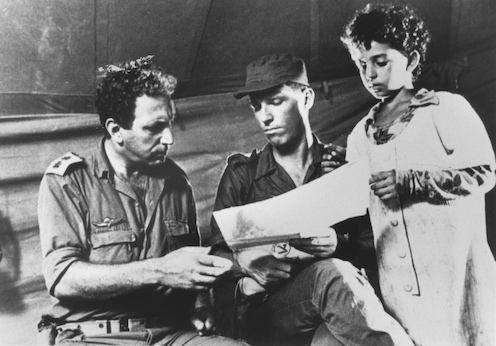The Smile of the Lamb

Full Description
Based on the book by David Grossman, THE SMILE OF THE LAMB is a contemporary fable about innocence, betrayal, and the gulf between Palestinians and Israelis. Once upon a time in the West Bank, Katzman, a Polish Holocaust survivor, is the military governor. Uri, his best friend, is an idealistic Sephardic doctor serving under him. Hilmi is an aged, eccentric Palestinian who lives in a cave. Uri meets Hilmi and begins to spend more and more time in his vivid and often bizarre dreamworld. But then Uri discovers his wife is having an affair with Katzman, and Hilmi discovers that his son has been killed by Katzman's soldiers in an ambush. Hilmi and Uri concoct a scheme to put an end to these injustices, but their fate has already been sealed. Beautiful cinematography and great Middle-Eastern music. Best Picture, 1986 Israeli Academy Awards.
Filmmaker Bio(s)
Shimon Dotan, Producer and Director, was born in Romania in 1949 and moved to Israel in 1959; grew up in an agricultural cooperative, served in the Israeli Navy, and then studied fine arts at Tel Aviv University. He also served as president of the Israeli Diving Federation. Dotan has taught filmmaking at Tel Aviv University and at Concordia University in Montreal. Presently he works out of New York and Montreal
Dotan's films have enjoyed both critical acclaim and commercial success. His debut writing/directing/producing effort, Repeat Dive, which chronicles Dotan's own experiences as a member of Israel's elite Navy Commando unit, won three Israeli Academy Awards, including Best Picture and Best Director, and was selected for the official competition at the Berlin Film Festival. He followed that effort with two short quasi-documentaries, Souvenirs from Tel Aviv (chronicling a demonstration against the Israeli invasion of Lebanon) and Souvenirs from Hebron (which followed an Israeli military patrol on its rounds through the Casbah of the Arab town). His 1986 feature film The Smile of the Lamb written, produced (with Jonathan Aroch), and directed by Dotan, a further exploration of the Israeli-Palestinian divide, won numerous awards including the Silver Bear at Berlin and six Israeli Academy Awards, including those for Best Director and Best Picture. In 1991, Dotan directed The Finest Hour for 21st Century, starring Rob Lowe, Tracy Griffith and Gale Hanson. Warriors, a commercially successful feature was produced and directed by Dotan in 1994 and starred Academy Award nominee Gary Busey and Michael Pare. In 1996 Dotan directed and produced Coyote Run, starring Peter Greene, Macha Grenon and Michael Pare'. The critically acclaimed You Can Thank Me Later was produced (with Netaya Anbar) and directed by Dotan in 1998, staring Ellen Burstyn, Amanda Plummer Genevieve Boujold and Mary McDonnell. In 1999/2000 Dotan produced four films; The List with Ryan O'Neal and Ben Gazara, Cause of Death with Patrick Bergin and Michael Ironside, Wilder with Pam Grier Romano Orzari and Rutger Hauer and Hidden Agenda with Dolph Lundgren and Maxim Roy.
The critics have been very receptive and praising of Dothan's fine work, calling it ". Visually stunning and lyrical ... of breathtaking beauty and power". The Hollywood Reporter considered Repeat Dive "a gripping study of the psychological effects upon those who live in a country where war and death are a constant reality", and the Los Angeles Times said that Dotan "has a keen eye for capturing a flickering spark of repressed emotions".
In 1992 Dotan, together with partner Netaya Anbar, established Cinequest Films Inc., which produces feature films out of Montreal and New York.
Director(s)
Country(ies)
Language(s)
w/English Subtitle
Release Year
Festival Year(s)
Running Time
95
